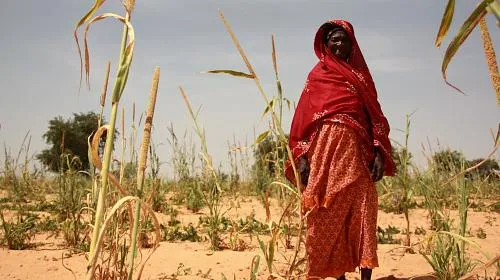OTTAWA (September 19, 2018) – As G7 ministers prepare to discuss ridding the oceans of plastics, CARE is also calling on officials to dive deeper with climate change commitments to protect the most vulnerable, particularly women and girls. From September 19-21, G7 ministers on environment and energy from Canada, France, the United States, the United Kingdom, Germany, Japan and Italy, as well as the European Union will meet in Halifax under the announced theme of climate change, oceans and clean energy. CARE International today released a new report “Punching below their weight” which monitors the support that G7 provides on climate change adaptation and gender equality to vulnerable developing countries, analyzing OECD data.
“We applaud the efforts of environmentalists who are making a real difference to push for action to protect marine life and livelihoods. While this cleanup is welcome, we can’t ignore the devastating impact climate change is having on the most vulnerable right now, in the Philippines and worldwide,” says Gillian Barth, president and CEO for CARE Canada.
Climate change impacts are already hitting poor communities around the world today and it is often marginalized women and girls who are most affected. Understanding the different gender roles and addressing barriers for women is essential to promote concrete solutions and strengthen women’s capacity to influence change.
“CARE’s new report, for the first time, provides an in-depth analysis of the G7’s adaptation finance to poor countries, and how much attention they give to gender equality. We conclude from our analysis that there is much more work to be done to integrate gender equality in projects that protect poor communities from climate change impacts,” says Sven Harmeling, CARE International’s Global Policy Lead Climate Change and Resilience, and main author of the report.
These meetings follow the aftermath hurricanes and typhoons have left in the past week. The severity of Florence in the United States and Mangkhut in the Philippines are a reminder to coastal nations of the increased risk they face from extreme weather. At the same time, vulnerable countries that contribute few carbon emissions are under growing strain from climate impacts, such as sea level rise and more extreme and frequent natural disasters.
“The G7, as the countries’ most responsible for climate change, need to step up their support for climate change adaptation to vulnerable countries. We estimate that it would be necessary to triple the adaptation finance reported to the OECD of USD 9bn in 2016 by 2020 to appropriately contribute to the 100 billion goal promised by developed countries,” says Harmeling. “Clear signals of stepping up on adaptation finance by the ministers would also help build confidence for the crucial upcoming climate summit, COP24 in Katowice, Poland.”
Some of the results of the report released by CARE, which is based on the OECD database of development finance with the latest figures available for 2016, include:
● In absolute terms, the EU institutions, Japan and Germany reported adaptation finance totals over USD 2bn each, on average, between 2013-2016.
● The US (74%), Canada (71%), and Germany (61%) paid the most attention to gender equality (2013-2016 average, funding amount) within projects counted as adaptation, whereas Japan (29%) and France (24%) rank the lowest.
● In terms of the adaptation finance, Canada and EU institutions show a positive trend with continuous increases since 2014, with the US stepping up in 2016 under the Obama administration. Unfortunately, the Trump Administration’s turnaround on climate finance threatens this positive trend and might leave more people unprotected from climate risks.
● The absolute numbers reported to the OECD, however, must be handled with caution, due to concerns of inaccurate accounting practices by the donor countries, where often questionable objectives are reported.
Media Contact:
Camilla Schramek, cschramek@careclimatechange.org or +45 50 22 92 88

